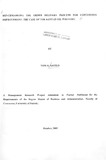| dc.contributor.author | Amolo, Tom | |
| dc.date.accessioned | 2013-05-10T15:37:20Z | |
| dc.date.available | 2013-05-10T15:37:20Z | |
| dc.date.issued | 2002 | |
| dc.identifier.uri | http://erepository.uonbi.ac.ke:8080/xmlui/handle/123456789/21596 | |
| dc.description.abstract | The study sought to investigate and document the use of benchmarking as a tool for continuous
performance improvement by the Kenyan oil companies. It was based on eight oil companies
that are registered by the ministry of energy.
The objectives of the study were; to determine the extent to which Kenyan oil companies use
benchmarking as a tool for continuous performance improvement, to establish whether there
has been improved performance of Kenyan Oil companies who have used benchmarking as a
strategy for continuous improvement and to document the challenges facing the Kenyan Oil
companies in benchmarking.
Cross sectional survey was used in this study. Primary data was collected by use of a
questionnaire. The data was obtained from eight of the eleven firms who were sent
questionnaires. The findings of this study indicate that Kenyan oil companies do not
systematically use benchmarking as a tool for continuous improvement. There is lack of trained
manpower in this area. They also face serious obstacles when they try to obtain information
about other firms. This has made difficult for these oil companies to identify best practices
against which they can benchmark their operations. Consequently they have used operations
standards in the order delivery standard which might not necessarily be the best in the markets.
However the study revealed that there has been improvement on the performance of those
Kenyan oil companies which have used benchmarking in their operations.
In view of the study's findings a few recommendations hM.vebeen made. First the Kenyan oil
companies need to develop clear policies on the use of benchmarking Secondly they need to
invest in resources to enable them carry out effective benchmarking. They need to train their
staff on benchmarking activities ie diagnosis of company processes, planning for site visits and
information gathering, implementation of the new processes learned during site visits etc.
Finally it would be useful if Kenyan Oil companies can come together and form data centres to
share benchmark information. Kenyan Universities could also consider forming data centres,
which can be used to collect information on business processes. The Universities can provide
such business process information to the Kenyan companies on consultancy basis at a fee. This
would help in providing accurate information to the companies . | en |
| dc.description.sponsorship | The University of Nairobi | en |
| dc.language.iso | en | en |
| dc.subject | Benchmarking the order delivery process | en |
| dc.subject | Kenyan oil industry | en |
| dc.title | Benchmarking the order delivery process for continuous Improvement- the case of the Kenyan oil industry | en |
| dc.type | Thesis | en |
| local.publisher | Department of commerce | en |

